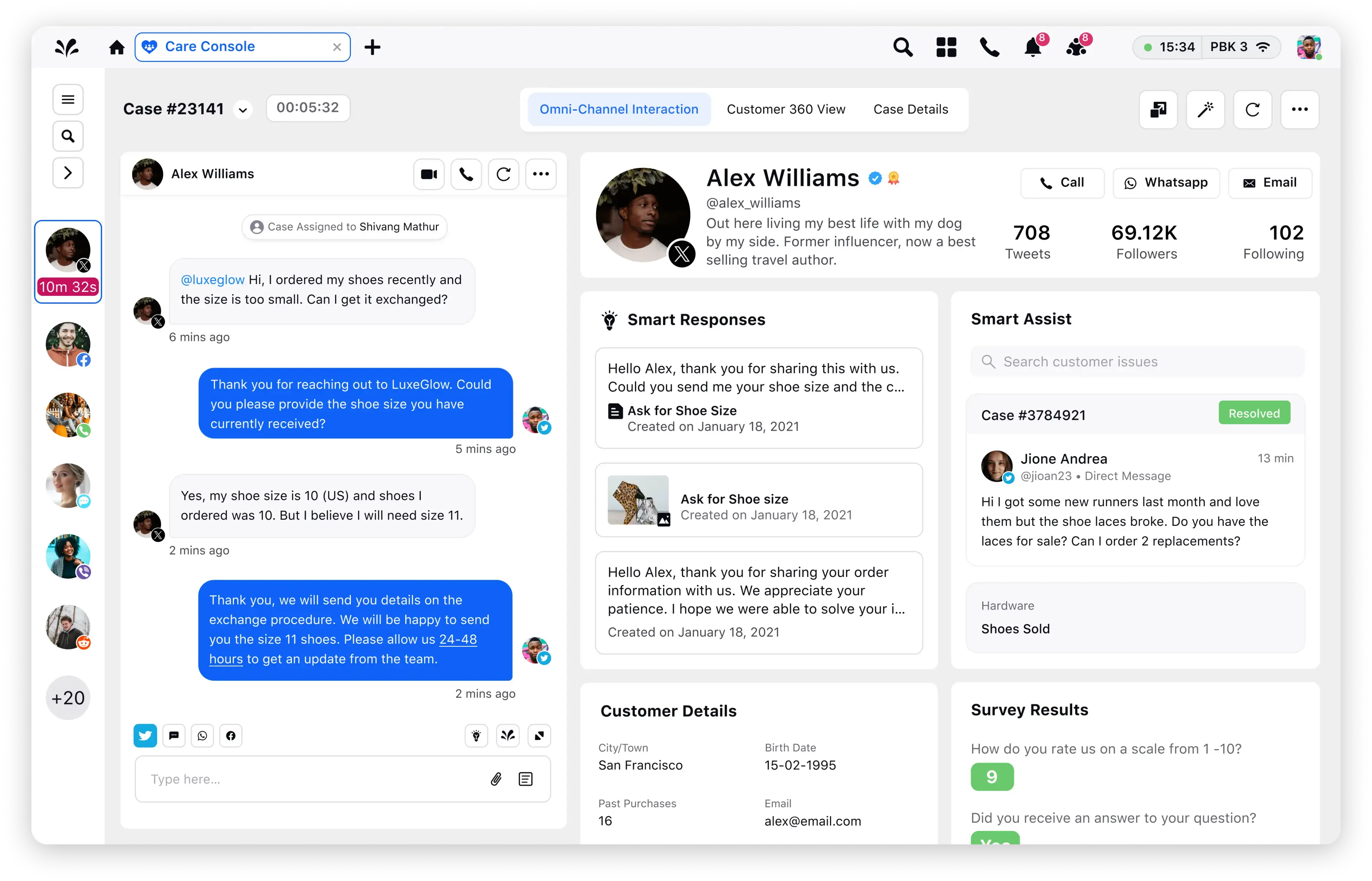The next generation of CCaaS is here
Digital-first customer service, enterprise-scale voice support. Redefine customer service with an AI-powered platform that unifies voice, digital and social channels. Power channel-less interactions and seamless resolution no matter the channel of contact.

10 customer service coaching tips to supercharge your support teams
Customer service coaching is crucial for delivering support experiences that make your users recall your brand fondly. Coaching and training your agents helps you render better customer service and foster positive agent relationships that reduce long-term employee churn. A staggering 94% of employees say they’d stay at a company for longer if it invested in learning and development.
It’s an effect that trickles down to your customers — happy employees deliver happier customer service. Customer service coaching tips help your agents to stay abreast of customer perceptions and tackle any problems that head their way efficiently.
Although coaching pays off in terms of employee satisfaction, customer experience and revenue retention, it’s hard for leaders to provide effective coaching.
Let’s explore how coaching customer service skills can transform your team’s performance and take it to the next level.
What is customer service coaching?
Customer service coaching is an ongoing process of upskilling care agents to help them deliver exceptional customer service experiences.
A coaching plan for customer service includes drills to improve soft skills, conflict management, crisis resolution and product expertise.
A well-designed customer service coaching plan narrows down areas of improvement through past performance data to help agents put their best foot forward. The standard of your customer service makes you win or lose users. It is a thin line to tread, which makes timely interventions imperative to maintain service quality. Customer support coaching also becomes extremely important if you are using contact center as a service (CCaaS).
Customer service training vs. customer service coaching
In general speech, the words “training” and “coaching” are interchangeable.
However, in a customer service scenario, they both refer to interlinked yet unique techniques of upskilling agents.
Customer service training is a unidirectional process. It’s usually short, one-size-fits-all baseline upskilling for new team members. It helps agents absorb the foundational basics of customer service. Training frameworks usually follow a fixed checklist of grounds that apply to everyone in the training session.
Whereas customer service coaching looks at preparing agents from a closer vantage point. It is a data-driven approach focusing on personalized feedback and 1:1 mentoring sessions. Coaching sessions are often based on individual performance reviews, with suggestions to level up customer interactions.
A coaching plan can include training as a module. However, training is a short-term, standalone activity per se.

What is the importance of customer service coaching?
Almost 41% of learning and development leaders will invest more to upskill their teams in 2023.
Why, you ask?
Because customer service quality coaching ensures your users receive nothing short of stellar experiences. Here are the benefits of customer service coaching:
1. No knowledge silos
It’s crucial for your customer service agents to have the right product expertise and process understanding. Closing any knowledge gaps or ambiguities lets your agents deliver uncompromising customer service.
2. Customer retention
The formula is pretty simple. Good customer service at every touchpoint builds better buying experiences, which in turn nurture a sense of loyalty in customers. When delightful customer service differentiates you from your competitors, customers are bound to return to you for more.
3. Aligned goals and collective effort
Teams yield the best results when they have a clear view of what matters. Customer service coaching techniques should help agents prioritize skills that are of burning need.
For example, while the impact of learned technical know-how is measurable, soft skills are no less important. A support agent with excellent product knowledge but coachable social skills may struggle to connect with users.
10 best tips for customer service coaching
You should meticulously design a customer service coaching plan to ensure each agent in the team has mastered the right skills.
Let’s elaborate on each of these.
1. Maintain a free flow of communication
Your agents are your frontline soldiers dealing with customer interactions of varying intensities. They might run into a crisis or doubt the best course of action.
As a trainer and coach, you must keep a free line of communication between you and your agents. You need to make sure no doubts, questions, or lags keep your agents from performing their best.
2. Tap into real-time opportunities
A customer service coaching session need not necessarily be a scheduled quarterly activity. The daily life of customer support teams presents itself with many learning opportunities.
For instance, if you find an agent not resolving tickets in one shot, you can use it as an opportunity to coach and mentor them in real time to help them get their first call resolution (FCR) rates back on track.

3. Prioritize interpersonal skills
Human beings are social creatures. We build our perceptions and relationships based on how effectively we connect and relate with others around us.
A good customer service coaching technique will help agents develop more emotional intelligence, empathy and aptitude to support users even in tense situations. In fact, empathy and the ability to communicate clearly are the top two soft skills to have today to thrive in digital workspaces.
4. Use performance data to tailor coaching methods
An effective coaching plan to improve customer service should rely on the treasure trove of past data to identify gaps. The history of customer care chats and phone calls can help you bring your agents’ strengths and weaknesses to light.
Whether the issue is with behavioral skills, non-compliance to defined protocols, or inability to process specific requests, past-performance data can help you personalize coaching.
Your care agents are individuals with varying levels of expertise. Effective customer service coaching can make use of time freed up by their automation engine and the data gleaned from their customer experience management (CXM) platform to tailor lessons to the agent level. More personalized coaching delivers higher rewards.
5. Mentor the coaches
Your agents are as good as the resources who coach them. To ensure agents are working to the best of their abilities, you need to be able to communicate it in ways they grasp it.
Once you have built a customer service training program, let the coaches internalize it themselves before delivering it to the mentees.
6. Know it’s you and your agents vs. the problem
Good coaches understand the fragility of relationships. They know that the best way to help is by operating on the same wavelength as the student.
Be appreciative of the efforts your agents put in and don’t downplay the aspects they are excelling at. Validation from superiors can remarkably influence morale and motivate them to perform better.
Ensure you are not delivering your lessons in a way that makes your agents view you negatively. Instead of viewing the challenge as “their problem to fix,” focus on correcting it through a collective effort.
7. Leverage the power of groups
Effective coaching goes beyond a customer service coach spending one-on-one time with each agent. Your care agents can benefit just as much from each other as they can from leaders. Mature care organizations engage in group coaching and routine team huddles to foster a community of support among care agents.
8. Give new hires a support network
Your customer service coach can’t dedicate all their time to onboarding new hires. Successful care leaders ensure that new team members have multiple avenues of support by nesting them with cohorts of people from the start.
9. Use rules to give agents freedom
Customer service agents are prone to become a victim of monotony, which can result in high call center attrition. Unsurprisingly, a 2022 survey reveals that 60% of employees feel detached and unengaged at work. They want some level of autonomy in the way they render service to customers.
Successful care leaders use their “rules of engagement” as a living, evolving set of guidelines to empower agents. A good customer service coach ensures agents are familiar with the guidelines and allows them to act within the rules to put the customer first.

10. Invest in the right tech stack
Almost 71% of users want their interactions with brands to be personalized, making 76% upset when they aren’t. Mature care organizations use data to their advantage, leveraging an automation engine to test these and collect valuable customer insights to share with marketing, sales and other teams.
Futuristic technologies like AI can help agents derive answers and suggest contextual auto-responses through an FAQ bot, reducing their response times substantially. With the implementation of AI-assisted coaching tools, agents can easily handle problems that are difficult to automate.
We have also gathered coaching insights from the global brands we work with and our friends at Forrester and McKinsey. We compiled them into an e-book with eight expert tips for elevating your customer service coaching program.

